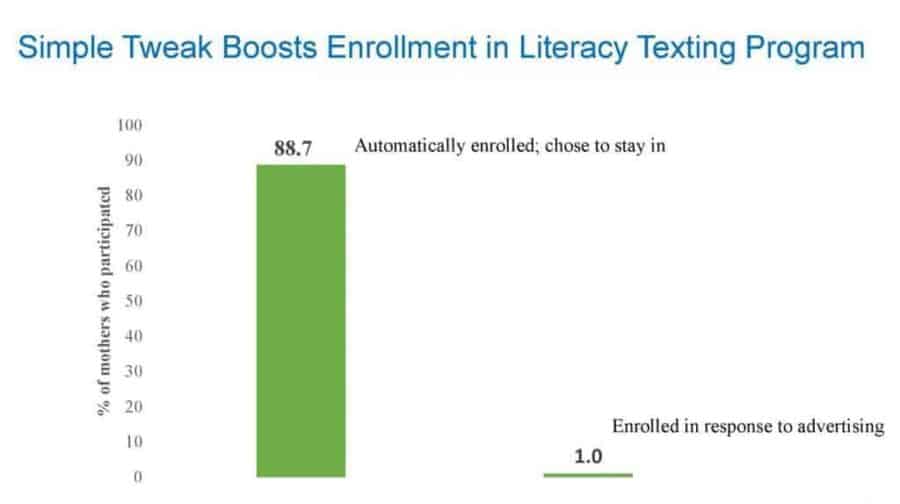Researchers know that texting programs can greatly benefit young children’s literacy. Now new research shows that parents’ participation in such programs can be boosted exponentially with one simple tweak: automatic enrollment, combined with the ability to opt out.
The new research from the Center for Child and Family Policy at Duke University’s Sanford School of Public Policy appears in the Journal of Child and Family Studies.
In recent years, mounting research evidence has shown texting to be an effective, low-cost, scalable approach for engaging parents in their children’s learning. Some studies suggest text message interventions via tips for parents on how to support their child’s development can put young children’s learning 2-3 months ahead.
Yet getting parents to enroll in these beneficial programs can be challenging. With that in mind, researchers designed a study to test strategies for increasing program participation.
In the study, researchers from Duke, New York University and Brooklyn College compare different enrollment options for the text-based early literacy program, Talk to Your Baby. The text-based 26-week course is designed to promote early language development for children up to 3 years old.
The researchers studied 405 mothers who were receiving newborn home visiting services through a free, city-wide program in New York City. Using a randomized controlled study, the researchers tested whether changing the enrollment option from opt-in to opt-out affects mothers’ take up and completion of the early literacy program. Participants were predominantly low-income and racially and ethnically diverse.
Results show that when automatically enrolled with a voluntary option to opt out, 88.7 percent of study participants stayed in the program for the full 26 weeks. In contrast, only 1 percent of mothers in the control group — who heard about the program through conventional recruitment flyers — voluntarily enrolled in the program. The findings suggest parents’ desire to participate in the program may be high but their ability to follow through is challenging, researchers said.
“A lot of time is spent in developing excellent and developmentally appropriate content for these programs and relatively little time is spent understanding how to make it easy for parents to engage,” said Lisa A. Gennetian, lead author of the study and Pritzker Associate Professor of Early Learning Policy Studies at Duke’s Sanford School of Public Policy. “Preserving parents’ choice to enroll in programs, especially those that are universally accessible and free, matters and we learned from this study that automatic enrollment minimizes burden on parents and can have enormous benefits in ways that do not interfere with their freedom.”
The study is the among the first to show that automatic enrollment is a promising strategy for increasing participation in early language and learning programs.
The study also showed the decision to stay in the program or opt out remained consistent for various subgroups. For instance, it made no difference whether this was a first birth or whether the other received public benefits. Such characteristics are sometimes cited as interfering with program participation.
“Opt-out strategies are liberally used in many aspects of our life, from organ donations to decisions about retirement benefits, and they are effective when done carefully,” Gennetian said. “Why wouldn’t we make life easier for parents and apply the same strategy of automatic enrollment with the ease of opting out?”
This research was supported by the Bezos Family Foundation and the National Institute for Child Health and Human Development (R03HD090280).
###
CITATION: “The Impact of Default Options for Parent Participation in an Early Language Intervention,” L.A. Gennetian, L.Z Coskun, J.L. Kennedy, et al. Journal of Child and Family Studies (2020).
DOI: https://doi.org/10.1007/s10826-020-01838-7

